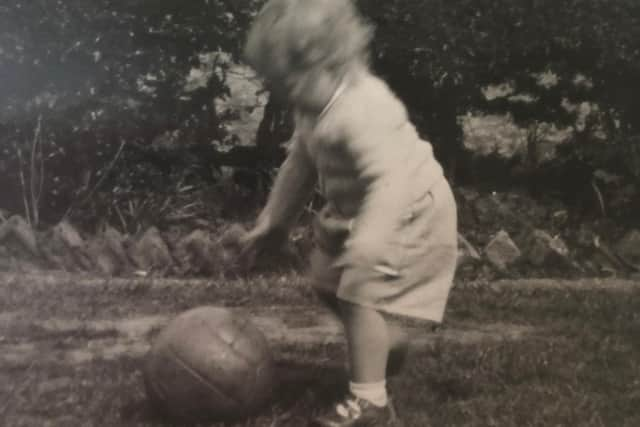This photo reminds me how far I have come - and how far I must yet go - Susan Dalgety
She must have been only about 18 months old, and the 1950s leather ball looked huge at her tiny feet, clad in leather sandals, her terry towelling nappy bulging beneath her shorts.
That little girl was of course me. The picture was taken at my grandparents’ farm cottage in deepest Wigtownshire, during a kickabout with my teenage uncles.
Advertisement
Hide AdAdvertisement
Hide AdLooking at it now, only three weeks before I officially become an old age pensioner, I am filled with a surplus of emotions. Surprise at the speed of time. It’s a well-worn cliché, but life really does speed by while you’re busy making other plans.
Delight that women’s football is, at last, taken seriously, thanks to the efforts of people like of Rachel Corsie, captain of the Scotland team, and of course the Lionesses, whose Euro victory last weekend brought a smile to a country weighed down by post-pandemic blues.
And a little sadness, even a tear or two. The photograph in my hand is of a toddler, her whole life ahead of her. The hands that held it are those of an old woman, spotted with age.
The trouble is I don’t feel old. Yet the letter from HMRC telling me that I have qualified for the full state pension after 46 years of national insurance contributions is proof of my pensioner status.


As are the aches and pains that punctuate my day, but I am lucky. Apart from chronic hypertension, triggered by pre-eclampsia during both my pregnancies, I am reasonably healthy. A little overweight, as the practice nurse would sniff during my annual blood pressure check in the days before Covid, but I am not in bad nick for an oldie.
I should be celebrating my endurance, but instead I am embarrassed about writing my age, worried that I won’t be taken seriously now that I am officially an old woman. Our society reveres youth, particularly in women.
Women over 50 are deemed ugly because of our ageing skin, our deepening voices and thinning hair. We are urged to spend money we can barely afford on botox and fillers and all manner of expensive potions that promise to reverse time.
Except that nothing really works. Madonna – 64 in a few days’ time – may think she looks 25 in her Insta feed. She just looks faintly ridiculous.
Advertisement
Hide AdAdvertisement
Hide AdOur views on everything from gender politics to music are dismissed as out-of-touch, or worse. JK Rowling – 57 a few days ago – may be immensely wealthy and talented, but the generation who grew up with Harry Potter now burn her books on Tik Tok. Why? Because she speaks her mind about being a woman.
And recent research shows that women over 55 struggle to get promoted in the workplace, while their male peers are “favoured” as they get older. Studies even show that employers want female staff who “look a certain way”, and that doesn’t include wrinkly hands and greying hair.
As Sharon Blackie writes in her new book, Hagitude, older women, when we are not being trivialised, are often ridiculed. She cites common terms such as “little old ladies”, “old bags” and my particular favourite, “old bats”, as proof of our society’s dismissal of female elders.
But as Blackie points out, there are a lot of ageing women out there. The "elderly'" is now the fastest growing segment of the population. The Scottish government predicts that by 2033 there will be a 50 per cent increase in people over 60. I am not alone.
And around the world, an army of older women keeps families and communities together. They provide an average of 4.3 hours of unpaid care and domestic work a day. It’s not just here that grandmothers provide essential – and free – childcare.
In countries like Malawi, agogos (grandmothers) are often responsible for raising children, orphaned by HIV and Aids, or to allow their parents to find work in the cities. They are also regarded as the guardians of wisdom, revered because of their age and the insight it brings.
So what am I to do, on the cusp of pensioner status? Sink into a world of incontinence pads, cheap hair dye and partial deafness, ignored by shop assistants, mocked by twenty-something activists on social media, and dismissed as interesting but irrelevant by younger people?
Or instead will I embrace this new stage of my life, the next big adventure, as Sharon Blackie urges in her book?
Advertisement
Hide AdAdvertisement
Hide AdAnd should I, as Magi Gibson writes in her poem, ‘Wild Women of a Certain Age’, wear my stretch marks like a shining honour, tip my eye cream down the pan and celebrate that our silver hair, our well-filled thighs and laughter lines, mean not that we are old, but that we live?
“I’m alive,” my dear friend Homba Mbekeani used to say when I asked her how she was, and until her death at 92, she was very much alive. The matriarch of her extended family, a wise elder in her church, a revered figure in her township.
Looking again at the little girl with the big football, I ache for the times when life was less than kind to her, but I also remember all the good times, from the birth of my grandchildren, to driving through Monument Valley in Arizona, letting the wind blow back my hair.
Putting the photograph away, I am ready for the next stage of my life. I hope the world is too.
